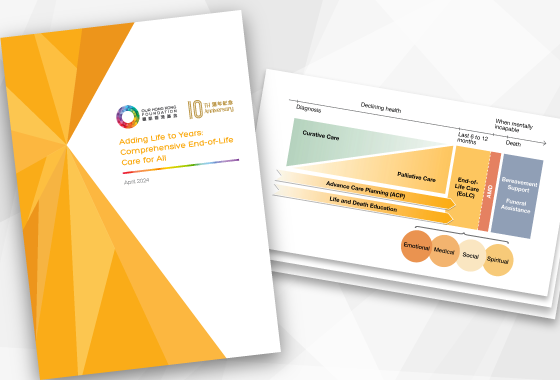Small step to ending health headache
This article appeared originally in The Standard on 23 May, 2019.
Authors: Dr Pamela Tin, Researcher ; John Ng, Assistant Researcher at the Public Policy Institute of Our Hong Kong Foundation

Finally, a long-delayed yet very timely series of public discussions about a fundamental piece of our collapsing health system - the severe shortage of doctors.
It resulted in the Medical Council exempting foreign-trained specialists, practicing under limited registration, from needing to complete internships to qualify for full registration.
They will still need to pass the council's licensing exam during their three years of service at our public hospitals, two medical schools or the Department of Health.
This is indeed a good step forward, albeit a small one to make our health system even more attractive. Why make it more attractive? Why foreign-trained doctors?
Whether at accident and emergency departments, or in lines for specialist consultations, waiting times can only be described as Sisyphean. Demand has seen no hint of waning as an aging population looms large on the horizon.

In the next 20 years, as many as 1.2 million will join the 65-and-above age group, and the resources needed to care for them will be at least five times that of those below 65. This can only add to the ever-increasing burden on our already overburdened health system.
For every 1,000 people we only have 1.9 doctors, far below the OECD average of 3.4 and we lag behind many international peers.
While medium to long-term measures are in place to increase supply, there is an urgent need to consider shorter-term remedies, including the amplification of the role of foreign-trained doctors.
While we are not alone in experiencing a shortage, we are definitely losing the global race in attracting foreign-trained doctors.
Currently, such doctors who wish to become fully registered in Hong Kong can opt for the "exam pathway."
After passing the three-part licensing exam, they also need to complete a post-exam internship consisting of mundane tasks such as measuring blood pressure.
Interestingly, internship experience is also a set prerequisite for the exam - a barrier that dissuades graduates of medical courses elsewhere that do not offer relevant experience.
Alternately, foreign-trained doctors can opt to work under limited registration through the non-exam pathway.
These doctors are confined to practicing at limited venues (public hospitals, the department, the two medical schools) for a limited duration (maximum of three years per contract). Resembling a blind alley, it does not offer progression to full registration.
Limited-registration doctors must take the exam pathway for full registration although they are now exempt from internship.
Thus, these well-qualified doctors already providing services in the local system or teaching our medical students will still be required to take the exam that tests all knowledge acquired during medical training.
This is regardless of expertise and years of clinical experience.
Evidently, much more could be done to enhance the attractiveness for foreign-trained doctors to practice here - many of whom are willing to give up established careers and way of life elsewhere.
This time, the council has focused on introducing flexibility to the non-exam pathway just for specialists practicing under limited registration.
Apart from internship exemption, there is definitely room to explore directly allowing graduates of top medical schools to progress from limited to full registration after serving our public sector for a set number of years.
Alternately, other means to objectively assess the ability of foreign-trained doctors other than the exam pathway could also be explored.
For example, workplace-based assessments, adopted in Singapore and Australia, could be considered.
Attention should also be given to making the exam pathway more attractive, such as omitting the pre-exam internship prerequisite or, with reference to the UK, allowing candidates to substitute the post-exam internship requirement with overseas internship experience on condition of working in the public sector for a set number of years.
Also, focus must expand from the recruitment of specialists to include non-specialists, especially since the Government has placed primary care development as a top priority.
It is high time to stop shutting foreign-trained doctors out.
The recent Medical Council decision was a good but just a small step forward among the many steps that could be taken to enhance the appeal for foreign-trained doctors to practice in Hong Kong.
Continuous discussion and action is needed in moving toward this much needed remedy to our health system.



